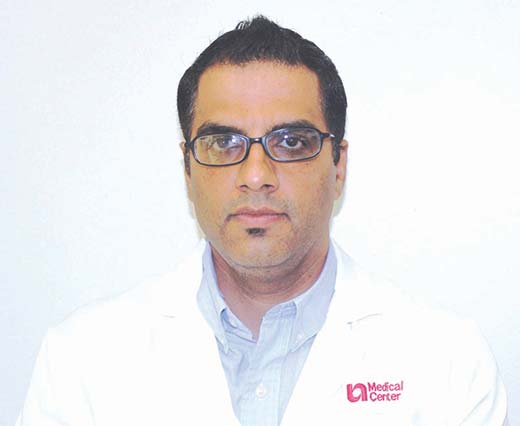Javeed Iqbal – Associate Professor in the Department of Pathology and Microbiology at the University of Nebraska Medical Center (UNMC), Omaha, Nebraska, USA – after completing his schooling from J&K Sainik School Manasbal went to Aligarh Muslim University for his bachelor’s and then Master’s Degree in Biochemistry.
After working on research projects for 1-2 years in India, Javeed, a resident of Barsoo, Awantipora, in South Kashmir, went to Germany for his post-doctorate degree (PhD) from Hans Knoll Institute at Friedrich Schiller University, Jena. There he received extensive training in techniques related to genomic profiling.
Recently he completed the Clinical and Translation Research (CTR) mentored scholar program and received a Masters in CTR from the University of Nebraska Medical Center (UNMC). He is in the USA since 2003.
In an email interview, Javeed Iqbal tells Saima Bhat that he would like to contribute to the Bio-medical research community in Kashmir in whatever way possible
KL: Your research has been supported/ funded by the three major organizations working for lymphoma/ Leukemia patients. You are the first Kashmiri to have this honour?
JI: I am not sure at this stage, but there are groups of highly talented researchers and biomedical scientists from Kashmir who have excelled in their respective field of research in the USA and Europe.
My initial part of research was funded by the Nebraska Medical Centre and the Lymphoma Research foundation (LRF). I received a translational Research Program (TRP) award from the Leukemia & Lymphoma Society (LLS). The aim of these grants is to translate basic biomedical findings to clinical application. I also received a young scientist award from the Lymphoma Foundation of America (LFA) for my contribution to lymphoma research.
Though I was the recipient, I must pay gratitude to my mentors/advisors and late father, as these awards reflect their contribution in my training and career. I had the privilege of collaborating with a group of highly qualified investigators across the USA and Europe, including haematologists, hematopathologists and geneticists working in the fields of lymphoma management, genomics/ bioinformatics, and laboratory diagnostics who have provided complementary expertise and support during these years.
KL: What is your research about? How is it going to help lymphoma/leukaemia patients?
JI: The major focus of my research is lymphoma genomics. In naïve terminology, lymphoma is cancer that generally arises in the lymphatic system and affects lymphocytes. These are immune cells that under normal circumstances fight infection and are generally in the mature stages of their developmental process. Leukaemia arises in Bone marrow and is cancer of blood-forming cells which are at the early stage in their development. There is also a subset of blood diseases, called lymphocytic /leukaemia, and they are characterised by the presence of leukemic cells in the lymphoid node. While the two cancers share certain symptoms, there are stark differences between their origins, symptoms, and treatments. These distinctions are important as their treatment regimens and prognosis differ significantly.
We study the whole genomes of lymphoma patients and investigate the aberrant changes compared to normal immune cells using state-of-the-art technology like DNA microarray technology and now with next-generation sequencing. These changes, whether structural or functional can be used to improve diagnosis and clinical outcome prediction. We also use these genomic profiles to identify possible targeted therapy approaches in these patients.
KL: Is there any plan to get your research included in Kashmir so that it helps patients here?
JI: Unfortunately, I do not have interaction with many biomedical scientists in Kashmir. I know a couple of my school mates working at several institutions in Kashmir, with whom I exchange pleasantries, but haven’t initiated any collaborative research projects. I must admit, high throughput genomic research does require investment in infrastructure, equipment, human resource training and a committed group of clinician scientists. No doubt, we have a group of highly talented clinicians and biomedical scientists in Kashmir, but they need to put their efforts together to focus on diseases that are unique to the valley. It will require a lot of patience in building these groups and eventually make a remarkable change in disease outcome. With improving technologies and computer applications in medical sciences, a lot can be achieved now, which was unthinkable just a few years ago.
KL: How bad is the situation in Kashmir viz-a-viz prevalence of lymphoma/leukaemia?
JI: I am not aware of exact numbers, but a number of Kashmiri clinicians who got trained in oncology have noted a substantial number of lymphoma patients in the valley. However, I am not aware of any recent peer-reviewed study about the incidence of lymphoma/leukaemia in Kashmir. Since only 2 major hospitals have cancer centres in the valley, it would be of great help to have an overall survey of lymphoid malignancies. The translation aspect of research and clinical management of patients varies immensely in the western world and our part of the world.
KL: Have you ever thought of coming back and working in Kashmir?
JI: It is a difficult question to answer at this stage. However, I do visit my family there every year. No, I haven’t asked for work in the valley. There are many imminent issues that the valley faces, so looking for a job never crossed my mind. I would like to contribute to the biomedical research community in whatever way possible.
KL: How many Kashmiris are working with you there?
JI: There are a number of Kashmiri scientists and clinicians working in different areas at Omaha. In my laboratory people from several nationalities including a few from Kashmir, work with me.
















